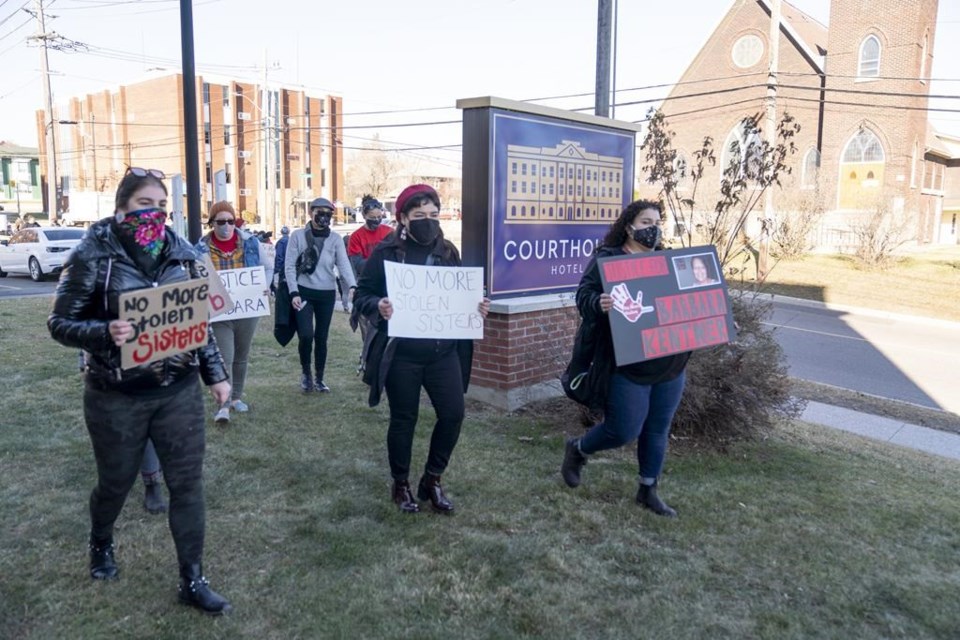A judge is set to rule Monday on whether a man who threw a trailer hitch at an Indigenous woman should be found guilty of manslaughter.
The trial surrounding the death of Barbara Kentner in Thunder Bay, Ont., took place last month.
Kentner died in July 2017, months after she suffered internal injuries from a trailer hitch thrown from a moving vehicle.
Brayden Bushby, 18 at the time, admitted to throwing the hitch at Kentner on Jan. 29, 2017, and pleaded guilty to aggravated assault but not guilty to manslaughter.
His lawyer argued that Kentner's underlying health conditions cast doubt on the true cause of her death.
The trial heard from a forensic pathologist that the hitch assault ruptured Kentner's small bowel and that caused an abdominal infection that "hastened" the 34-year-old woman's death, although she had an underlying illness that contributed.
Witnesses who were with Bushby testified that he was drunk at the time and laughed after he threw the hitch.
Kentner's sister testified she remembered someone hanging out of a vehicle saying "I got one'' after the hitch was thrown.
Anishinaabe elder Ma-Nee Chacaby, who was among a group of activists who gathered outside the courthouse to show support for Kentner's family during the trial, said she found Kentner's sister's testimony disturbing
“It scared me when I heard that,” Chacaby said. “What were they doing, riding around looking for something to hurt somebody?”
Chacaby and others planned to rally again on Sunday to draw attention to the case ahead of Monday's verdict.
“We wanted to support the Kentner family to let them know that we're all there for them, to support them, whatever the verdict’s going to be,” she said.
Bushby was originally charged with second-degree murder but that was later changed to manslaughter and aggravated assault.
The trial heard the change was made because space limitations made a jury trial impossible in Thunder Bay during the COVID-19 pandemic
Crown lawyer Andrew Sadler said it was a priority for the trial to proceed this fall, and the "only way'' for that to happen was to have a trial by judge alone, which "could not happen, in this case, on the charge of murder.''
That decision drew criticism about how the justice system deals with cases involving Indigenous victims.
Regional chiefs in Ontario, Quebec and British Columbia decried the change in a letter calling for the murder charge to be reinstated.
Treaty 3 Grand Chief Francis Kavanaugh, whose territory includes northwestern Ontario, expressed outrage.
“We see this time and time again where violence against Indigenous people is not given the same level of care and attention in the Canadian justice system,” he said in a statement at the time, adding that “it is difficult to believe there is not a racial component to this decision."
Kentner’s death speaks to many Indigenous people’s experience in the city, he said.
The trial follows several cases that raised doubts about access to justice for Indigenous people who lost their lives in the city.
The city's police chief announced last year that the force would reinvestigate the deaths of at least nine Indigenous people after an external review found flaws in the original investigations.
That announcement came a few years after an inquest was held into the deaths of seven First Nations youth who died while attending school in the city, with recommendations for governments and other institutions to address racism and isolation Indigenous students face in Thunder Bay.
Daniel Brown with the Criminal Lawyers Association said it’s unusual to see a murder charge downgraded in a case like this, but noted that jury trials across the country have been disrupted because of COVID-19, and prosecutors have to consider the backlog of cases that could pile up if delays continue.
“It's a fairly rare occurrence that the prosecutor will reduce the charges in order to encourage a defendant to proceed by a judge alone, but there are other types of quid pro quos that are happening across the country,” Brown said from Toronto.
Both sides need to agree to hold a judge-alone trial in a murder case, and Brown said any negotiated compromises are made with the expectation that they will stay private.
This report by The Canadian Press was first published Dec. 13, 2020.
Holly McKenzie-Sutter, The Canadian Press

